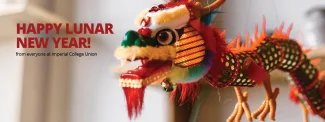我僅代表帝國理工學院學生會祝各位虎年快樂, 身體健康, 恭喜發財。
On behalf of Imperial College Union, I would like to wish you a happy Lunar New Year. Wishing you good health and prosperity in the Year of the Tiger!
What is Chinese New Year?
Tuesday (1 Feb) marks the start of the Lunar New Year, also known in China as the Chinese New Year (CNY) or Spring Festival, China’s biggest holiday. It falls on a different date each year, but the celebration lasts 16 consecutive days, starting from New Year’s Eve (31 Jan) until the Lantern Festival (15 Feb). Only the first week of festivities, 31 Jan – 6 Feb, are considered a national holiday. Most celebrations involve family reunions, fireworks and feasts. It is also celebrated worldwide in countries with significant overseas Chinese populations.
According to tales and legends, Lunar New Year started with a beast called the Nian who would attack villagers every New Year’s Eve. Villagers would put up red banners, band drums and explode firecrackers to scare away the beast. The villagers then discovered that Nian was afraid of loud noises and the colour red. Hence, people follow the tradition to decorate their windows and doors with red papercuts and couplets, lighting firecrackers and giving money in red paper envelopes.
Want to wish your friends a Happy New Year? Then say: “Gong xi fa cai” - the most common Lunar New Year greeting in Mandarin. It directly translates into “wishing you great happiness and prosperity”. The same greeting in Cantonese, spoken in parts of Southern China and Hong Kong, is “kung hei fat choi”.
Here is more information related to CNY if you wish to understand more. On behalf of Imperial College Union, I would like to wish you all a happy Lunar New Year. Wishing you good health and prosperity in the Year of the Tiger!
Festivities
|
Date (as of the Chinese calendar) |
Date (as of the UK calendar) |
Action |
Symbolism |
|
Two days before Lunar New Year |
30/1 |
Spring cleaning |
To sweep away the bad luck of the preceding year |
|
Lunar New Year’s Eve |
31/1 |
Family dinner feast |
An important get-together meal, especially for those who never visited their family members for the entire year |
|
First day |
1/2 |
House gatherings, fireworks and firecrackers (depending on the location) |
To pay respect for the senior members (e.g., grandparents), married members give red envelopes to junior members of the family to symbolise wealth and good luck |
|
Second day |
2/2 |
Offering money to God of Wealth |
To symbolise a rewarding time after hardship in the preceding year |
|
Third day |
3/2 |
Stay at home/ visit the temple of the God of Wealth |
It is considered an unlucky day to have guests or go visiting |
|
Fourth day onwards |
4/2 – 14/2 |
To continue celebrate CNY (depends) |
/ |
|
Fifteenth day (End of Lunar New Year) |
15/2 |
Display lanterns and riddles, consume sweet rice balls (tangyuan) |
Honours deceased ancestors, family cohesion
|
Traditional Food
|
Food |
Description/ Symbolisation |
|
Fish |
Surpluses |
|
Mandarin oranges |
Luck |
|
Melon seed |
Fertility |
|
New Year’s cake |
A sticky rice cake Getting higher (career-wise) year after year |
|
Chicken |
|
|
Yau gok Jiaozi |
A dumpling (depending on the region) Gold-alike, symbolises prosperity |
|
Noodles |
Uncut noodles represent longevity |
